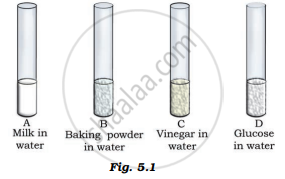Advertisements
Advertisements
Question
Oxides of metals are acidic in nature.
Options
True
False
Solution
This statement is False.
Explanation:
Oxides of metals are generally basic in nature, not acidic. When dissolved in water, metal oxides typically form bases or alkaline solutions. For example:
- Sodium oxide (Na2O) reacts with water to form sodium hydroxide (NaOH).
- Calcium oxide (CaO) reacts with water to form calcium hydroxide (Ca(OH)2).
RELATED QUESTIONS
Give one example in the following case:
A hydroxide which is insoluble in water.
Salts are neutral.
Sodium hydroxide is a ______.
Give the significance of pH of soil in agriculture.
Write any four uses of bases.
On adding phenolphthalein indicator to a colourless solution, no change is observed. What is the nature of this solution?
Look at Figure 5.1 which shows solutions taken in test tubes A, B, C and D. What colour is expected when a piece of red litmus paper is dropped in each test tube? The nature of the solutions is given in the table for your help.

| Test tube | Nature of Solution | Change in colour of red litmus |
| A | Neutral | |
| B | Basic | |
| C | Acidic | |
| D | Neutral |
Boojho, Paheli and their friend Golu were provided with a test tube each containing China rose solution which was pink in colour. Boojho added two drops of solution ‘A’ in his test tube and got dark pink colour. Paheli added 2 drops of solution ‘B’ to her test tube and got green colour. Golu added 2 drops of solution ‘C’ but could not get any change in colour. Suggest the possible cause for the variation in their results.
Match the following:
| 1. | Sulphuric acid | a. | Weak base |
| 2. | Sodium hydroxide | b. | Strong acid |
| 3. | Acetic acid | c. | Strong base |
| 4. | Ammonium hydroxide | d. | Weak acid |
Water-soluble bases are called ______.
